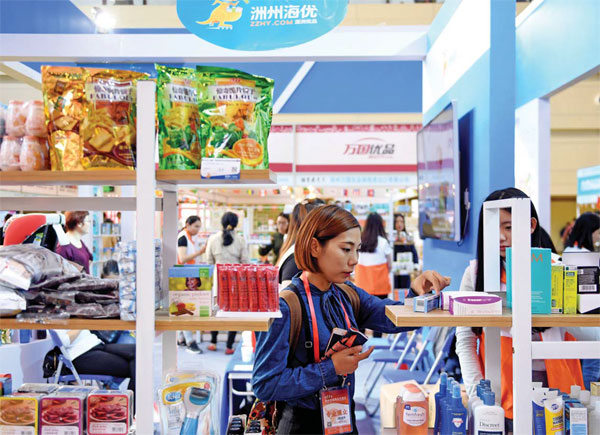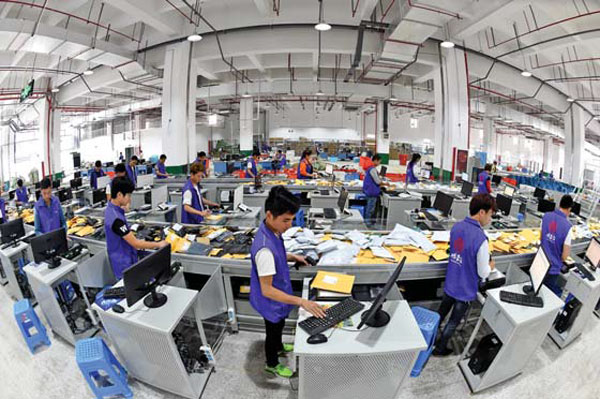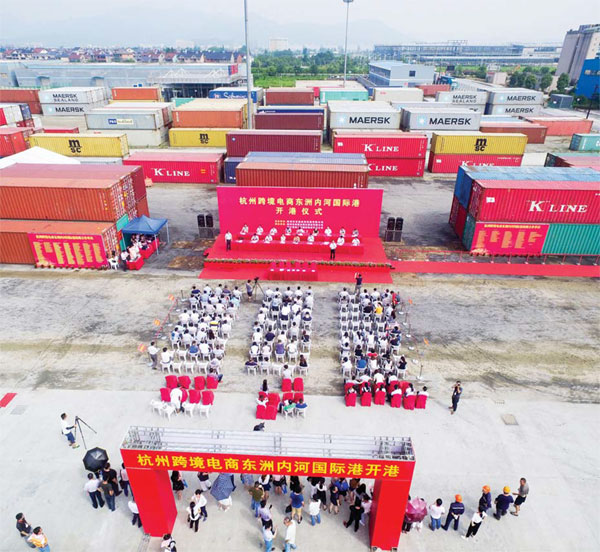Trade without frontiers
Updated: 2016-10-21 07:10
By Chen Yingqun(China Daily Europe)
|
|||||||||
How e-commerce breaks down barriers to worldwide shopping
Mother-to-be Zhang Yuan has been busily buying things for the baby and herself - but almost all of them are being mailed from overseas. They include feeding bottles from Japan, milk powder from New Zealand, body lotion from the United States and clothes from the United Kingdom.
"I want safety and good quality for myself and the baby. Some products from overseas are quite good and easy to get now. I just bought them from various e-commerce platforms and in a few days, or a few weeks, they will arrive in Beijing," she says.
Zhang, 30, is one of the many Chinese consumers who are passionate about overseas brands and products. The latest annual global cross-border survey by online payments service PayPal and French market research firm Ipsos found that 35 percent of Chinese online shoppers looked overseas for goods last year, compared with 26 percent in 2014.
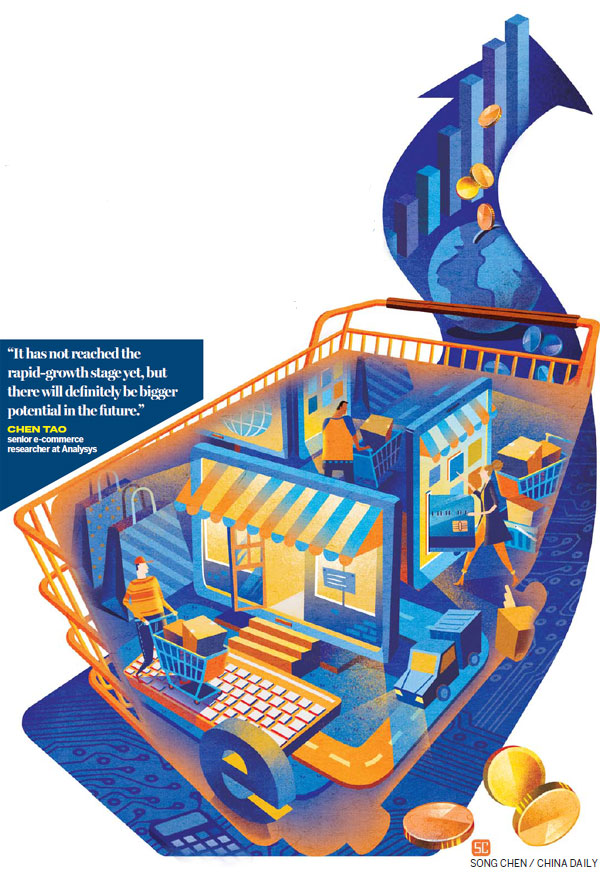
|
Exhibition areas for cross border e-commerce platforms are set up at the Zhengzhou National Community Fair in October. China's cross-border e-commerce has been growing over the past few years. Sha Lang / For China Daily |
|
Employees arrange parcels in cross border e-commerce in Yiwu, Zhejiang province. Gong Xianming / For China Daily |
Safety, convenience and authenticity are the top drivers for Chinese consumers who do cross-border shopping, says Patrick Foo, vice-president and general manager of PayPal's cross-border business for the Chinese mainland, Hong Kong, Taiwan and South Korea.
Chen Tao, a senior e-commerce researcher at Analysys, a Beijing internet consultancy, says that China's cross-border e-commerce is still at an early development stage.
"It has not reached the rapid-growth stage yet, but there will definitely be bigger potential in the future," he says. 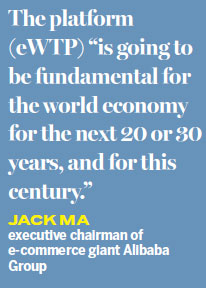
Chen says that in the past Chinese consumers mostly bought maternity, child and beauty products through cross-border online shopping, but now they buy a wide variety of items, such as health products, electronic goods and clothes.
"Chinese consumers' demands have been upgraded. They now have higher requirements for quality, safety and variety, but at present domestic products still can't fully meet their requirements. That is why more people are turning to cross-border shopping," he says.
China's cross-border e-commerce has been growing over the past few years. Statistics from the China E-Commerce Research Center show that, in 2015, China's cross-border e-commerce transactions totaled 5.4 trillion yuan ($800 billion, 730 billion euros, 660 billion pounds), a year-on-year increase of 28.6 percent. In the first half of 2016, transactions totaled about 2.6 trillion yuan, representing year-on-year growth of about 30 percent.
Amazon China said recently that since it launched its cross-border e-commerce strategy, Chinese consumers placed more than 10 million orders, sent directly from Amazon's overseas sites. In the first half of this year, purchases by Chinese customers from Amazon's overseas sites were four times the figure for the previous year.
A large number of Chinese e-commerce companies, such as Alibaba, JD.com and NetEase Koala, have developed their cross-border e-commerce businesses to help connect global sellers with Chinese consumers.
Rafael Jimenez, a business development expert at the EU SME Center, says that worldwide interest in China's e-commerce market has grown significantly in the past few years. Take search volume on Google as a simple example. There was a spike in the number of times that the term "China e-commerce" was searched for in April this year, quite possibly following the government's recent tax policy changes applied to cross-border e-commerce transactions, and then again the introduction of the "positive list", he says. 
Various countries have established partnerships with Chinese e-commerce platforms to reach the country's consumers. Canada launched its pavilion in Alibaba's Tmall Global platform ahead of the G20 leaders' summit in Hangzhou, providing Chinese consumers with access to Canadian brands, including yoga apparel-maker Lululemon and Clearwater Seafoods.
Canadian Prime Minister Justin Trudeau attributes the huge potential of online shopping to the rapid growth of the Chinese middle class.
"That means a bigger market for quality Canadian food, like beef and pork, but also for lobster and cherries," he said during his official visit to China in September.
Russia also launched its pavilion in Alibaba's Tmall Global platform in September, featuring Russian commodities such as food, toys, tourism and many others. Alibaba now has 16 countries' pavilions on its platform.
Research by consultancy Accenture and Alibaba shows that the value of cross-border business-to-customer e-commerce is set to grow from $230 billion in 2014 to $994 billion in 2020, accounting for almost 30 percent of all B2C e-commerce.
The Ministry of Commerce has forecast that the volume of cross-border e-commerce in 2016 will reach 6.5 trillion yuan and will soon account for 20 percent of China's foreign trade.
Gianfranco Casati, group chief executive for emerging markets at Accenture, says that in January the State Council approved the establishment of 12 more zones in China, including Tianjin, Shanghai and Chongqing. These are designated exclusively for the development of the cross-border e-commerce industry and have preferential tax policies and streamlined customs clearance procedures.
Chen says that to better regulate cross-border e-commerce, the Chinese government has also unveiled several policies this year, such as the positive list of cross-border e-commerce products in April, regulations on milk powder and certain cosmetics later.
"These regulations are necessary for a healthy market and fair competition," he says.
Cross-border e-commerce has also been recognized as having huge potential to boost global economic activity, especially the development of small and medium-sized companies.
Jack Ma, executive chairman of e-commerce giant Alibaba Group, has called for the establishment of an electronic world trade platform (eWTP). The aim is to reduce barriers to make it easier for small and medium-sized enterprises to expand their trading capabilities worldwide.
Ma views the eWTP as an international cooperation mechanism, led by the private sector and driven by businesses with support from governments. Through public-private dialogue, and by discussing, exploring the best practices to promote cross-border e-trade and building up related regulations and standards, it can create a fertile soil for the development of the internet economy and e-commerce worldwide.
The platform "is going to be fundamental for the world economy for the next 20 or 30 years, and for this century", Ma said before the 2016 B20 Summit in Hangzhou in September. Recognized by many industry observers as an effective way to boost the development of small and medium- enterprises, the eWTP initiative appears in the final B20 Policy Report.
Luigi Gambardella, president of ChinaEU, says he endorsed the proposal to establish an eWTP.
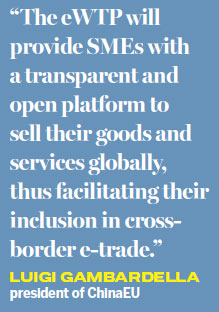
"The solution for today's economic slowdown is to increase inclusion in global trade and improve the involvement of SMEs," he says. "The eWTP will provide SMEs with a transparent and open platform to sell their goods and services globally, thus facilitating their inclusion in cross-border e-trade."
But he also says the final goal should be e-commerce without borders that gives consumers freedom to shop online without limitations.
Chen adds that the eWTP would be a supplement to the current global trade system and regulation, which could reduce protectionism. For SMEs globally, it could help reduce costs and help them compete in a fairer environment with big companies.
"The eWTP has been initiated by Chinese companies and will build a trade framework that Chinese companies are familiar with, so it will also provide opportunities to speed up globalization," he says.
But Jimenez says that although the eWTP looks very beneficial in principle for international trade, especially for SMEs, and some of the overhead of international trade could be substantially reduced, he predicts it will not be easy to implement. The Chinese e-commerce ecosystem is in some ways unique and probably not as easy and quick to integrate as some of the proponents of the eWTP believe, he says.
chenyingqun@chinadaily.com.cn
|
The opening ceremony of an international container port for cross-border e-commerce in Hangzhou, Zhejiang province. Jack Ma, executive chairman of e-commerce giant Alibaba Group, has called for the establishment of an electronic world trade platform to make it easier for small and medium-sized enterprises to expand their trading capabilities worldwide. Provided to China Daily |
(China Daily European Weekly 10/21/2016 page1)
Today's Top News
UK's May tries to reassure EU on Brexit
Lawmakers stage walkout to protest anti-China acts
Syrian army declares 3-day truce in Aleppo
BBC report on Terracotta Warriors refuted
Iraqi forces recapture more villages around Mosul
Greeks rally against labor reforms
Iraqi forces fighting all out to free Mosul from IS
Chinese pupils flock to UK independent schools
Hot Topics
Lunar probe , China growth forecasts, Emission rules get tougher, China seen through 'colored lens', International board,
Editor's Picks

|

|

|

|

|

|
